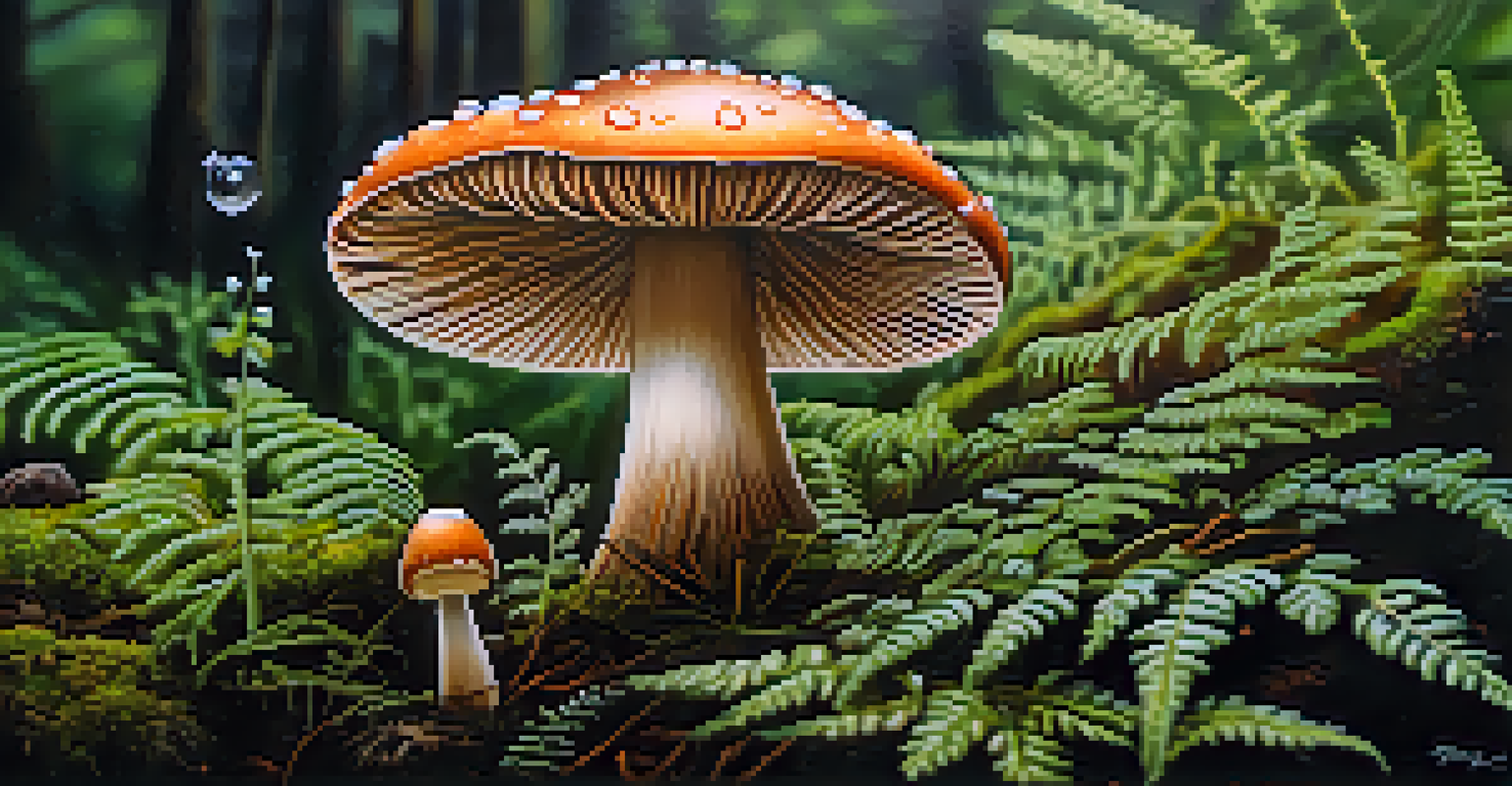The Legal History of Psychedelics: Key Case Studies Explained

The Early Days: Psychedelics in Medicine and Research
In the early 20th century, psychedelics like LSD and psilocybin were seen as promising tools for psychiatry. Researchers believed these substances could unlock new pathways to understanding the mind and treating mental health conditions. However, this optimism was short-lived as societal perceptions began to shift dramatically.
The mind is a wonderful servant but a terrible master.
The 1960s ushered in a counterculture movement that embraced psychedelic use, leading to widespread experimentation. Unfortunately, this surge in popularity caught the attention of lawmakers and fueled fears about public safety and morality. As a result, many governments started to impose stricter regulations on these substances, setting the stage for legal battles to come.
This period of exploration and subsequent backlash laid the groundwork for a complex legal landscape. Understanding these early developments is crucial, as they highlight the tension between scientific inquiry and societal concerns that continues to influence psychedelic legislation today.
The Controlled Substances Act of 1970: A Turning Point
The enactment of the Controlled Substances Act (CSA) marked a significant turning point in the legal history of psychedelics. This legislation classified various substances into schedules based on their potential for abuse and medical use, placing many psychedelics in Schedule I. This designation effectively banned any medical or recreational use, declaring them to have no accepted medical use.

The implications of the CSA were far-reaching, stifling research and discussion around psychedelics for decades. With researchers unable to legally access these substances, the potential benefits of psychedelics in treating conditions like PTSD and depression were largely ignored. This created a gap in scientific understanding that would take years to bridge.
Psychedelics: A Historical Overview
The early 20th century saw psychedelics as promising psychiatric tools, but societal backlash led to strict regulations that stifled research.
The CSA's impact on public perception and scientific inquiry cannot be overstated. It not only criminalized the use of psychedelics but also instilled a stigma that has lingered in society, complicating efforts to reintroduce these substances in medical contexts.
Roe v. Wade and the Intersection of Psychedelics and Rights
While Roe v. Wade primarily focused on reproductive rights, it also had implications for personal freedoms, including the use of psychedelics. The ruling emphasized the importance of individual autonomy, suggesting that people should have the right to make decisions about their own bodies. This idea resonates with the arguments made by advocates for the decriminalization of psychedelic substances.
Psychedelics are not a panacea, but they can help us understand the complexity of the human experience.
The connection between personal rights and drug use has fueled ongoing discussions about the legality of psychedelics. Advocates argue that just as reproductive rights were fought for, so too should individuals be allowed to choose their paths regarding psychedelic use for personal and therapeutic purposes. This perspective challenges the traditional views held by lawmakers.
The legacy of Roe v. Wade continues to inspire movements advocating for drug policy reform. By framing the conversation around personal rights, proponents seek to shift public perception and encourage legal changes that recognize the potential benefits of psychedelics.
Case Study: The Legalization of Medical Marijuana
The legalization of medical marijuana in various states has had a ripple effect on the conversation surrounding psychedelics. As society became more open to the medical benefits of cannabis, advocates for psychedelics began to draw parallels with their own cause. This shift in public opinion helped create a more favorable environment for discussing the potential therapeutic uses of psychedelics.
Several states have since moved to explore the legalization of psilocybin and other psychedelics for medical purposes. These efforts often cite the promising results of early research, which suggests that psychedelics can treat conditions ranging from anxiety to addiction. The evolving landscape of cannabis legality has opened doors for similar discussions about psychedelics.
Impact of the Controlled Substances Act
The 1970 Controlled Substances Act classified many psychedelics as Schedule I, effectively banning their medical use and fostering stigma.
This case study underscores the importance of changing societal views in shaping legal frameworks. The successes and challenges faced by medical marijuana advocates serve as a roadmap for those pushing for psychedelic legalization, highlighting the power of grassroots movements in influencing policy.
Psychedelics and the War on Drugs: A Historical Context
The War on Drugs has been a significant factor in the legal history of psychedelics. Initiated in the 1970s, this campaign aimed to reduce illegal drug use and trafficking but often resulted in severe penalties for possession and use of psychedelics. The punitive measures disproportionately affected marginalized communities, raising questions about fairness and justice.
As public sentiment began to shift in the 2010s, calls for reform grew louder. Many advocates argued that the War on Drugs not only failed to reduce drug use but also exacerbated social issues. This realization has prompted a re-evaluation of drug policies, including those surrounding psychedelics.
Understanding the context of the War on Drugs is essential for grasping the current legal battles surrounding psychedelics. It illustrates the interplay between social justice and drug policy, highlighting the need for a comprehensive approach to reform that considers the historical injustices that many communities have faced.
Recent Developments: Oregon and the Push for Legalization
In 2020, Oregon made headlines by becoming the first state to legalize psilocybin for therapeutic use, marking a groundbreaking moment in the legal history of psychedelics. This decision reflected a shift towards recognizing the potential benefits of psychedelics in mental health treatment. The state's approach included a structured program for administering psilocybin under professional guidance.
Oregon's decision has sparked interest and discussion in other states looking to follow suit. As research continues to emerge highlighting the efficacy of psychedelics in treating various mental health disorders, more jurisdictions are considering similar policies. This trend indicates a growing acceptance of psychedelics in the medical community.
Oregon's Legalization: A Turning Point
Oregon's 2020 decision to legalize psilocybin for therapeutic use marks a significant shift towards recognizing the medical potential of psychedelics.
The developments in Oregon serve as a beacon for advocates nationwide. They demonstrate that change is possible and can lead to a more nuanced understanding of psychedelics' role in society, paving the way for future legal reforms.
The Future of Psychedelic Legislation: Trends and Predictions
As we look to the future, the landscape of psychedelic legislation is evolving rapidly. With increasing public interest in mental health and alternative therapies, there is a growing push for reform at both state and federal levels. This momentum is fueled by ongoing research that supports the therapeutic potential of psychedelics.
Additionally, a new generation of lawmakers and advocates is entering the conversation, bringing fresh perspectives on drug policy. These individuals often prioritize health and well-being over punitive measures, suggesting that a more compassionate approach to drug use is on the horizon. This paradigm shift could lead to significant changes in how psychedelics are perceived and regulated.

While challenges remain, the future of psychedelic legislation appears promising. As awareness and understanding grow, there is hope for a legal framework that not only recognizes the potential benefits of psychedelics but also seeks to rectify past injustices and prioritize public health.